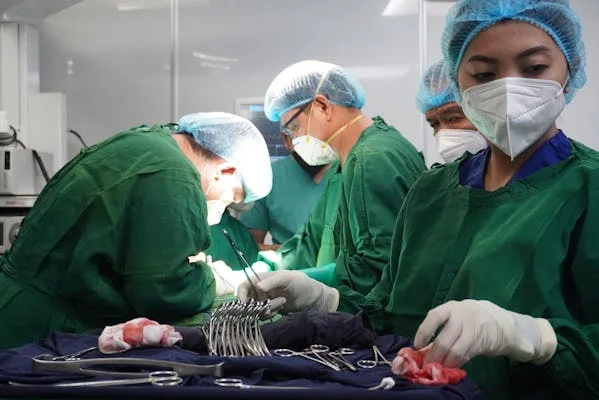The Vital Role of Locum Tenens General Surgeons
In today’s healthcare industry, locum tenens positions have become an essential part of providing patient care in a variety of settings. These temporary roles are crucial for filling gaps in staffing due to medical leave, vacations, or a shortage of specialists in certain regions. A locum tenens general surgeon plays a key role in ensuring that patients continue to receive high-quality care. But what exactly are the education requirements for locum tenens general surgeons? This article will provide a comprehensive guide on the educational pathway and essential qualifications for becoming a locum tenens general surgeon.
What is a Locum Tenens General Surgeon?
Before diving into the educational requirements, it’s important to understand the role of a locum tenens general surgeon. A locum tenens surgeon is a licensed surgeon who temporarily fills in for another physician who is absent or on leave. They perform general surgery tasks, which can range from routine procedures to emergency surgeries, depending on the facility’s needs.
Locum tenens surgeons typically work on a contract basis for a specific period, providing flexibility and an opportunity to gain diverse professional experience. These positions are highly sought after by healthcare facilities in underserved areas or those experiencing staffing shortages.
Education Requirements for Locum Tenens General Surgeons
To be eligible for a locum tenens general surgeon role, candidates must meet the same education requirements as permanent general surgeons. Below are the essential steps:
1. Bachelor’s Degree
The first step in becoming a general surgeon is obtaining a bachelor’s degree. While there is no specific major required, most future surgeons choose a science-related field, such as biology, chemistry, or pre-medical studies. A strong academic foundation in these areas is critical for success in medical school.
Duration: 4 years
2. Medical School
After earning a bachelor’s degree, aspiring surgeons must attend medical school. Medical school provides the rigorous education and training required to become a licensed physician. In the United States, the most common route is attending an accredited medical school that confers a Doctor of Medicine (M.D.) or Doctor of Osteopathic Medicine (D.O.) degree.
Medical school programs are designed to equip students with knowledge in anatomy, physiology, pharmacology, and medical ethics. Students also gain hands-on experience through clinical rotations in various specialties, including surgery.
Duration: 4 years
3. General Surgery Residency Program
After completing medical school, prospective surgeons must enter a residency program in general surgery. Residency is a crucial part of surgical training, where individuals learn advanced surgical techniques under the supervision of experienced surgeons. During this time, residents work in various settings, from hospital operating rooms to outpatient clinics.
General surgery residency typically covers areas like trauma surgery, endocrine surgery, gastrointestinal surgery, and vascular surgery. Residency programs also include rotations in sub-specialties that are part of general surgery.
Duration: 5-7 years
4. Board Certification
After completing a residency program, general surgeons must obtain board certification to practice independently. This process involves passing exams administered by the American Board of Surgery (ABS) or a similar professional body. Board certification demonstrates that the surgeon has met high standards in knowledge, skills, and clinical competence.
Certification Requirements:
- Completion of an accredited residency program.
- Successful completion of the board certification exams.
- Ongoing education and recertification every 10 years.
5. Licensing
Before a general surgeon can begin practicing, they must obtain a medical license from the state in which they intend to work. Licensing requirements vary by state but typically involve passing the United States Medical Licensing Examination (USMLE) or an equivalent exam, as well as submitting to a background check and other state-specific requirements.
Duration: Varies by state
6. Continuing Medical Education (CME)
Locum tenens general surgeons, like all physicians, must continue their education throughout their careers to stay current with medical advancements and meet licensing and certification requirements. Surgeons must participate in continuing medical education (CME) programs, which can include attending medical conferences, workshops, or completing online courses.
Duration: Ongoing
Additional Skills and Certifications for Locum Tenens General Surgeons
In addition to formal education and training, locum tenens general surgeons may be required to demonstrate proficiency in other areas. These additional skills and certifications may vary depending on the healthcare facility or the specific locum tenens assignment. Here are a few common requirements:
1. Advanced Surgical Techniques
Locum tenens surgeons may be required to perform specialized procedures in addition to routine surgeries. This could include minimally invasive surgery techniques, robotic surgery, or other advanced surgical methods.
2. BLS and ACLS Certification
Basic Life Support (BLS) and Advanced Cardiovascular Life Support (ACLS) certifications are commonly required for surgeons, ensuring they are equipped to handle emergencies in the operating room or during patient care.
3. Communication Skills
Surgeons, especially those in locum tenens roles, need excellent communication skills to collaborate with hospital staff, communicate with patients and their families, and integrate into a new work environment quickly.
4. Flexibility and Adaptability
Locum tenens surgeons must be highly adaptable, as they often work in new settings with varying patient populations and clinical environments. The ability to adjust to different hospital systems and procedures is crucial.
Why Choose a Locum Tenens General Surgery Career?
For many surgeons, locum tenens roles offer several benefits, including:
- Flexibility: Surgeons can choose when and where they work, providing a better work-life balance.
- Varied Experience: Locum tenens work provides the opportunity to practice in different settings, improving clinical skills and expanding professional networks.
- Higher Pay: Locum tenens surgeons often earn a higher hourly rate than permanent employees due to the temporary nature of the role and the demand for their services.
Conclusion
The path to becoming a locum tenens general surgeon is long and requires rigorous education, specialized training, and ongoing professional development. However, the rewards of flexibility, professional growth, and competitive pay make it an attractive career choice for many surgeons. With a well-rounded educational background and the necessary certifications, a locum tenens general surgeon can thrive in this rewarding and dynamic field.
FAQs About Locum Tenens General Surgeons Education Requirements
1. What are the basic educational requirements to become a locum tenens general surgeon?
To become a locum tenens general surgeon, you must first earn a bachelor’s degree, then complete medical school to obtain a Doctor of Medicine (M.D.) or Doctor of Osteopathic Medicine (D.O.) degree. After medical school, you will need to complete a general surgery residency program, followed by board certification and obtaining a medical license.
2. How long does it take to become a locum tenens general surgeon?
The process typically takes around 13-15 years:
- 4 years for a bachelor’s degree.
- 4 years of medical school.
- 5-7 years of general surgery residency.
- Additional time for board certification and licensing.
3. Is board certification required to work as a locum tenens general surgeon?
Yes, board certification from the American Board of Surgery (ABS) or a similar professional body is required to practice independently as a general surgeon. Certification demonstrates that you have met high standards in knowledge, skills, and clinical competence.
4. Can I work as a locum tenens general surgeon without completing a full residency program?
No, you must complete a residency program in general surgery to gain the required skills and training to become a licensed surgeon. While some temporary or part-time roles may not require residency in specific settings, full certification and training are essential for locum tenens roles.
5. Do locum tenens general surgeons need any additional certifications?
Yes, additional certifications such as Basic Life Support (BLS) and Advanced Cardiovascular Life Support (ACLS) are often required. Some surgeons may also need specialized skills in minimally invasive or robotic surgery, depending on the position.





